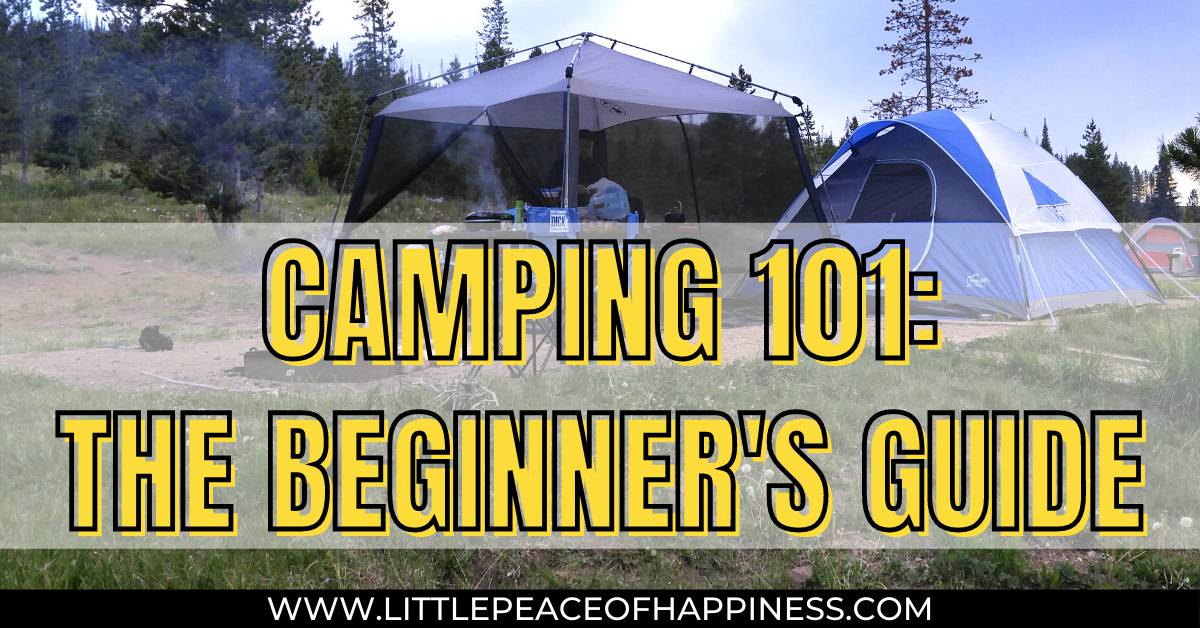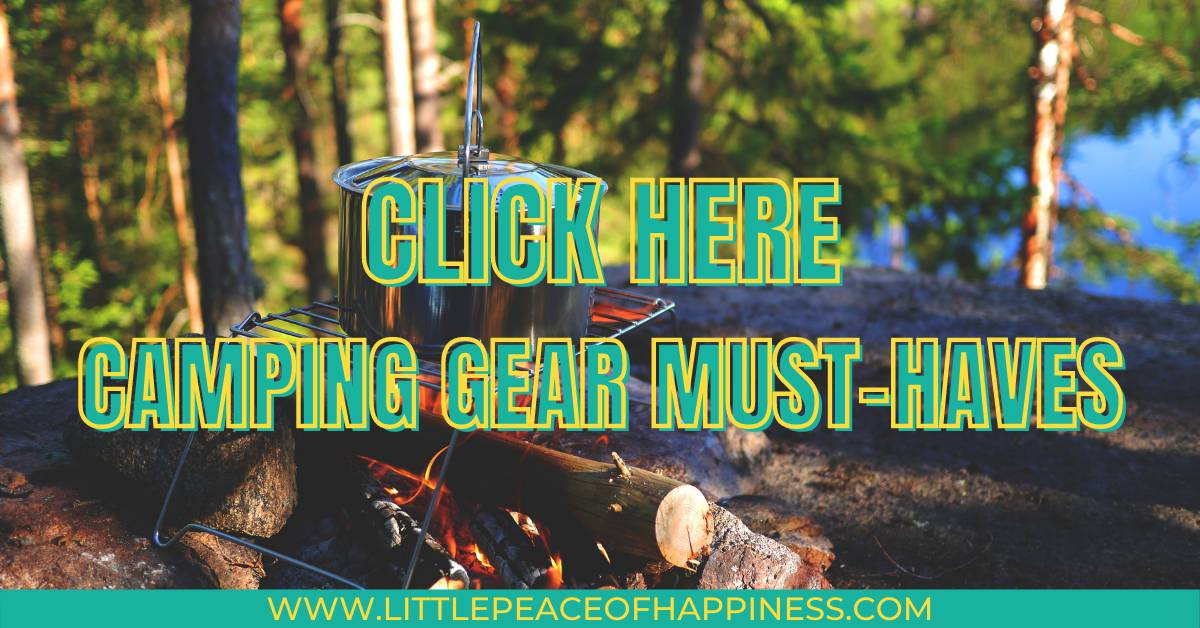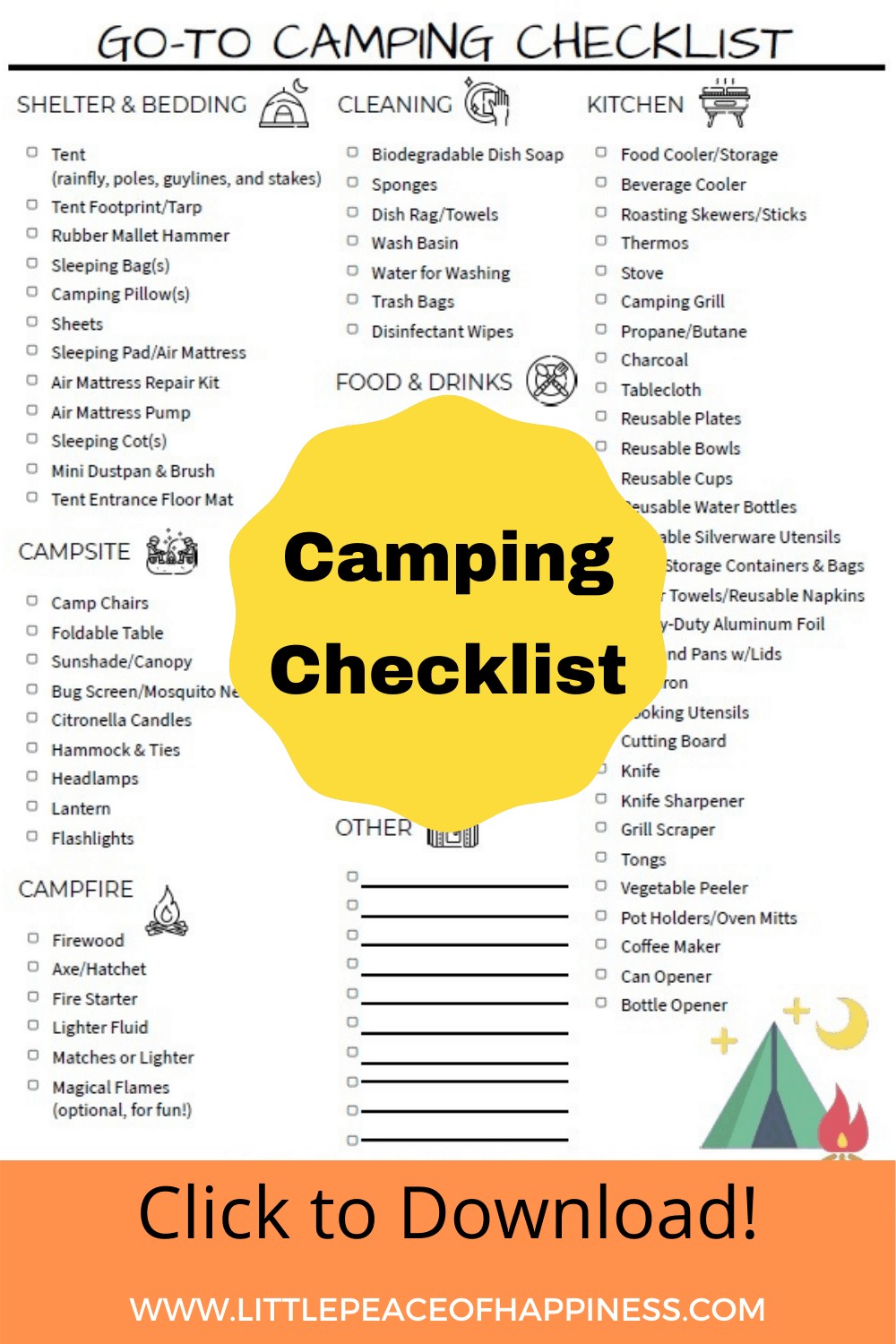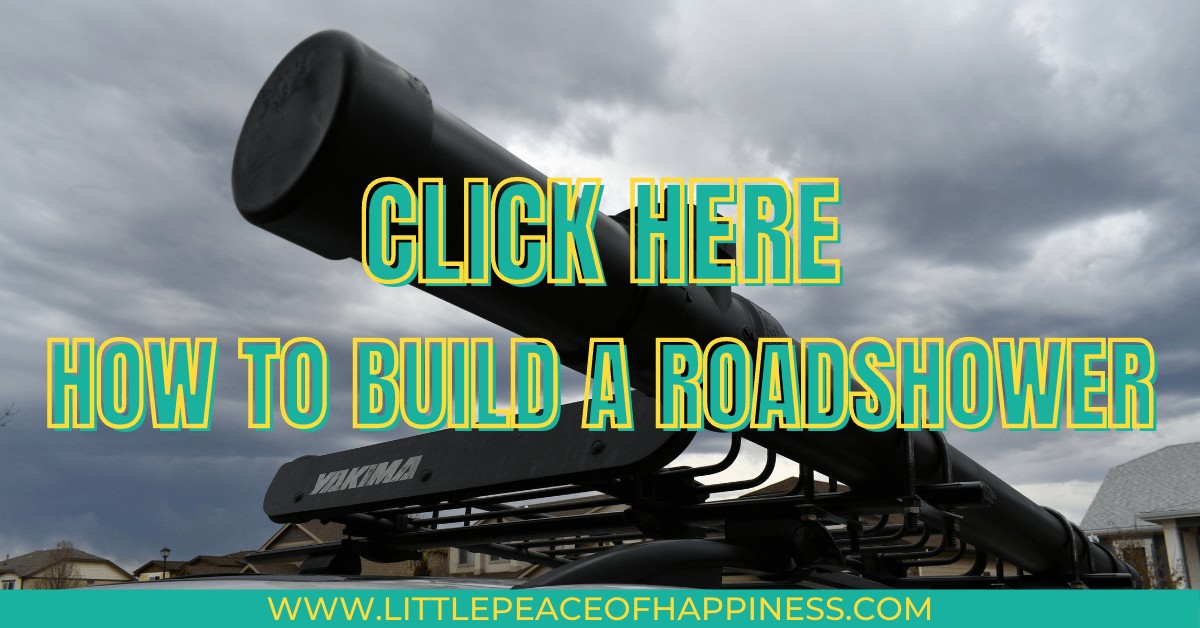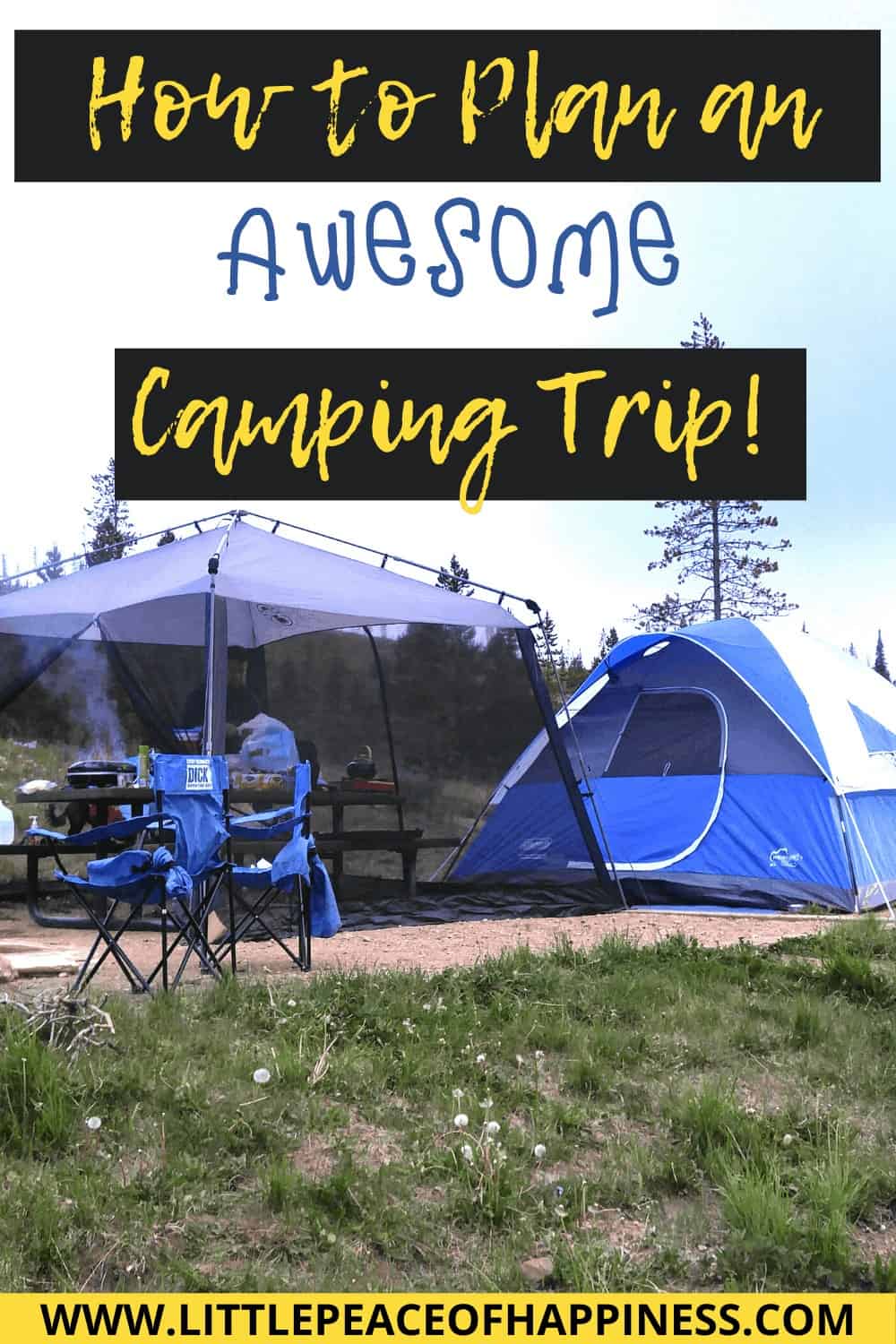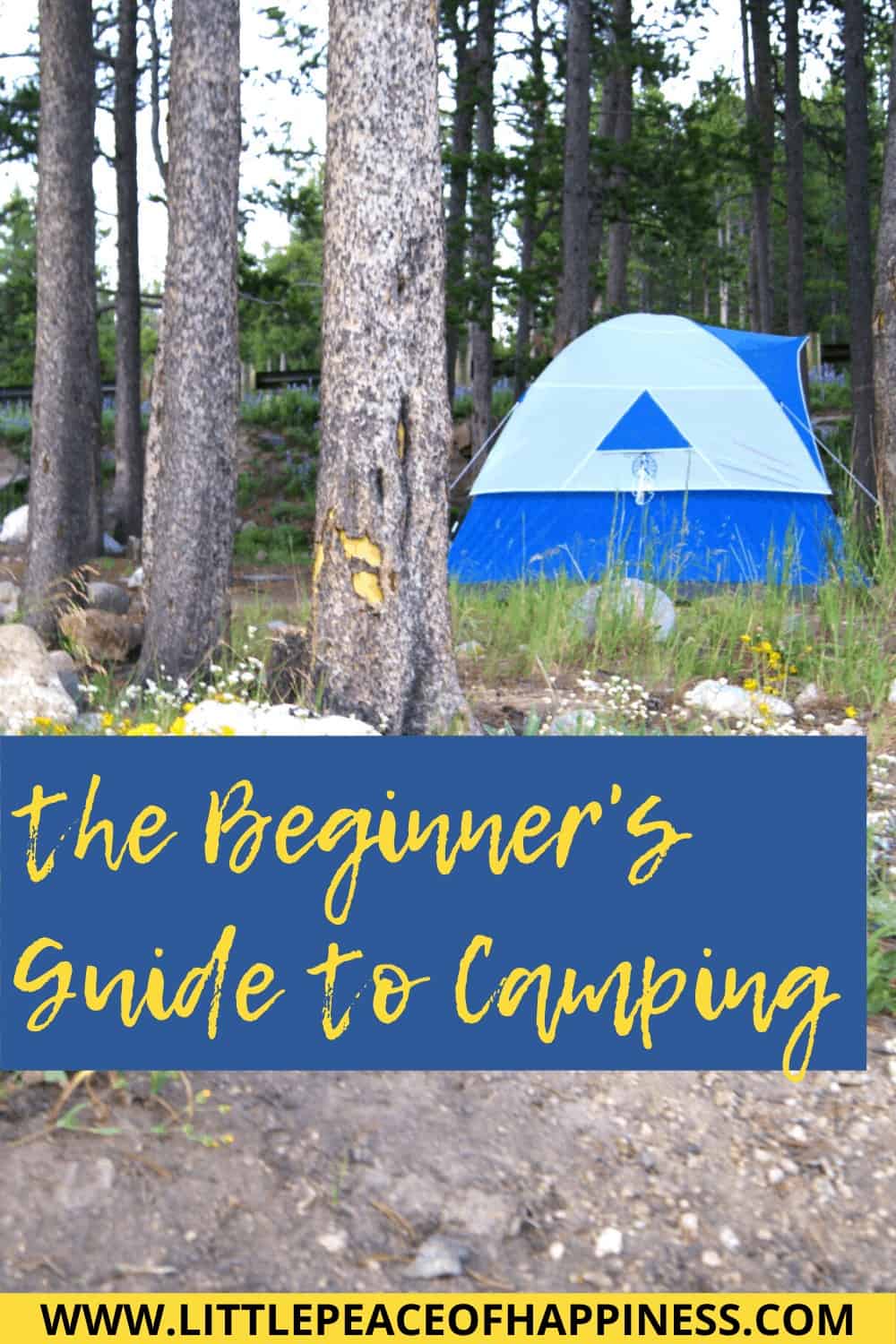Growing up in the city, I didn’t get a lot of exposure to camping or really much of the natural outdoors in my youth. It’s surprising that I even pursued a career in Wildlife Conservation.
Maybe it was living without it for so long, that made me really appreciate everything that nature has to offer and we’ve been camping since 2015.
In this post, I share camping basics from finding and choosing a campsite, what you need to bring on your camping trip, and outdoor etiquette.

Camping season is finally here and our weekends are filling up quickly with camping reservations, travelling, and birthday shenanigans.
If you’re totally new to the camping world, it can feel overwhelming with all the camping gear. Once you get the hang of camping and where to go, it’s really quite simple.
This post will also have a downloadable checklist for all the camping goodies to make planning your first and next camping trip easier!
Some of the links in this post are affiliate links. This means if you click on the link and/or purchase the item, I will receive an affiliate commission at no extra cost to you. All opinions remain my own.
Related Articles:
- 20 Camping Gear Essentials you Don’t Want to Forget
- How to DIY a Solar Outdoor Camp Shower on a Budget
- 25 Top Travel Tips to Consider When Planning Your Vacation
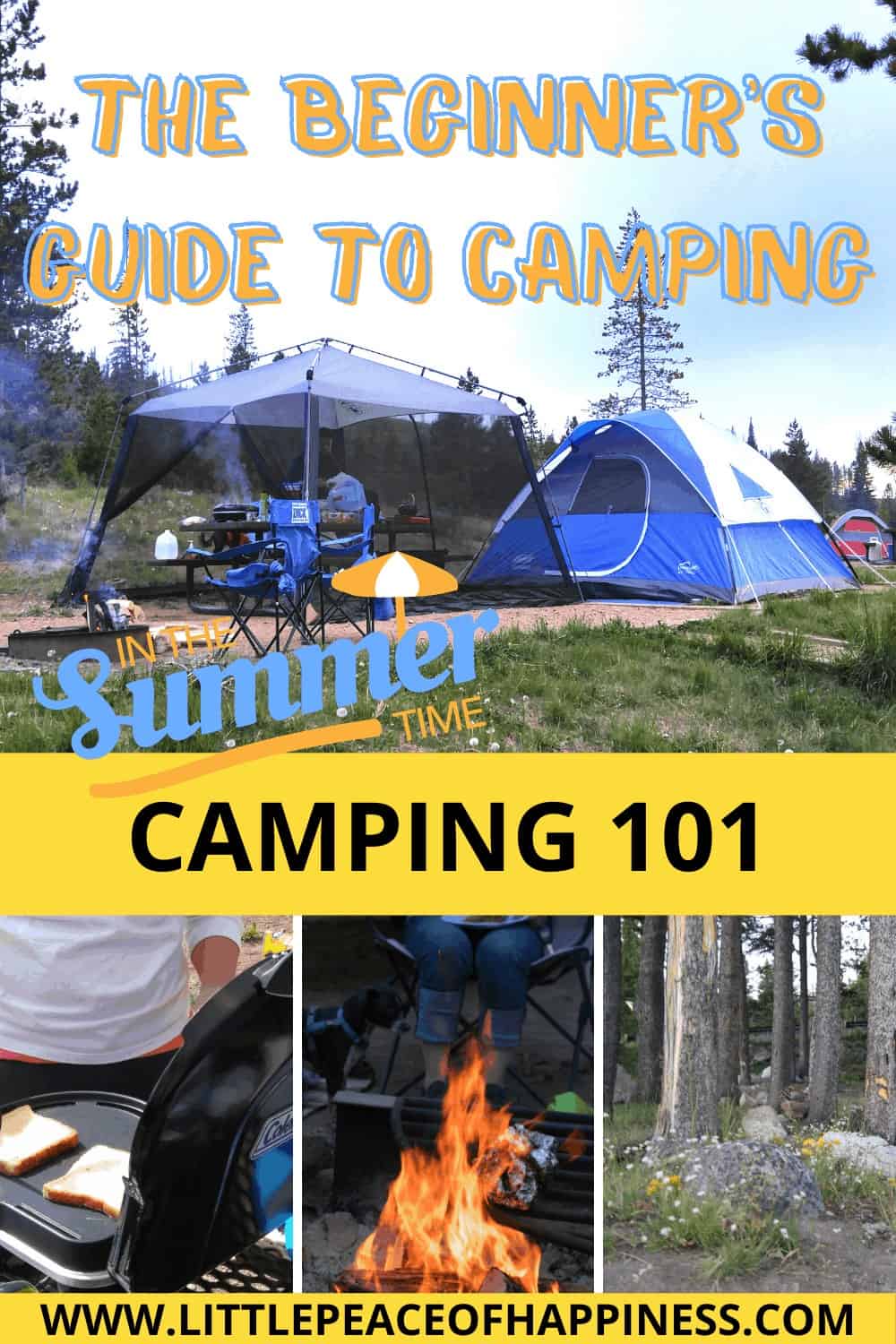
WHAT'S IN THIS POST?
Is Camping Worth the Investment?
If you’re unsure about camping, there are ways to explore this activity without spending a lot of money.
Camping with other experienced campers is a great way to start out and when you’re with the right people, it’ll always be a good time. You might even learn more tips and tricks from your camping buddies and you get to even test out their gear to see if it’s the right choice for you!
If you have friends who like to camp, you can save some money by borrowing their gear or joining them on their next camping trip.
Don’t have any camping buddies near you? No worries, you can rent gear too! You might be the first of your friends to try it out and introduce them to the amazing world of camping.
Outdoor companies like REI, rent out their camping gear for a small fee. If rentals are not an option, you can look for second hand camping gear from local meet ups and online selling platforms. Make sure to check online reviews for those used items and check the condition before buying.
What are the Benefits of Camping?
When I’m out in nature, all of my problems and worries seem so small in the large openness of our natural areas. Camping is a great way to take a break from all of the buzzing in social media and gives us a place to reset ourselves.
There is a benefit to disconnecting from the hustle and bustle of everyday life. When you’re in nature, you can just enjoy the warm sun on your skin, the smell of a nice campfire, and gaze at the stars when it is so dark that the moon is the only source of light.
It’s not a surprise that in the middle of the 2020 Coronavirus Pandemic many people started camping and enjoying the outdoors.
There’s a peace to being in nature that you don’t get anywhere else.

Where to Find a Campsite
First thing to know about your outdoors is that not all spaces are created equally. Natural areas can be broken down and managed by jurisdiction. Before you book a campsite, make sure you know which camping jurisdiction you are in and what their rules are.
You can camp on public lands and private campgrounds. Some sites are reserved for a fee and others are free as a first-come, first-serve.
For your first time, I highly recommended reserving a campsite. Loading up your car with camping gear and food for the weekend can be annoying if you risk the chance of not finding a first-come, first serve campsite.
When you’re looking for a campsite, be sure to do your research well in advance. Look a few months out, because the good spots are booked quickly as some campsites allow booking two months in advance and some even longer. Some places may even require a camping permit like those on National Park Service lands.
Related Articles:
- 20 Camping Gear Essentials you Don’t Want to Forget
- How to DIY a Solar Outdoor Camp Shower on a Budget
- 25 Top Travel Tips to Consider When Planning Your Vacation
Camping on Public Lands
Public lands are managed at local, county, state, and federal jurisdictions. In the federal system, there are four main agencies (U.S. Forest Service, National Park Service, Bureau of Land Management, and U.S. Fish and Wildlife Service) that manage our public lands for different purposes.
To find a campsite within the federal public lands, you can plan your next trip and reserve a campsite at recreation.gov.
For the most updated rules and regulations on what a campsite has to offer, I recommend going directly to the agency website for the recreational activities they offer and their rules.
Of these federal agencies, you won’t find camping opportunities with the U.S. Fish and Wildlife Service as their primary purpose is to protect the wildlife first and they offer other recreational activities during their open hours of operation.
Although federal public lands are the most popular camping destinations, we have also camped at county and state managed campsites, as well as private campgrounds. Do an online search for your county open spaces and state parks website to see if they offer camping in your area.

Camping on Private Campgrounds
Private campgrounds are those that are not managed by a government agency and instead a private owner that manages the grounds.
They can vary in price, size, amenities, and the “lodging type” that they offer. A largely known private campground is Campgrounds of America Ⓡ (KOA).
KOA is a large network of privately-owned campgrounds that offer a variety of experiences for the tent, RV, and cabin camping.
They are a great family friendly option for those looking for outdoor nature fun. If you book a cabin you can go without worrying about the natural elements of wind and rain.
We stayed in a cabin at the Mount Rushmore KOA Resort a few years ago and they even had their own waterpark!
Reserveamerica.com is another great campground directory and includes both public and privately owned campgrounds.
TIP: For public managed lands, save money on daily entrance fees by buying an annual pass. Keep in mind that each public jurisdiction has their own annual passes. Entry passes generally do not include the camping fees and will have to be purchased separately through the camping reservation.
How to Choose a Campsite
There are a few factors to consider when you’re choosing your campsite. Of course, you’ll have to narrow down your general area that you want to camp in and the time you want to travel to get there.
Not all campsites are made equally as some may have nice flush toilets, while others will have vault toilets that are serviced every other day. The recreational activities that you would like to experience during your camping trip will also play a factor.
When looking for a campsite, we like to consider the following:
- The distance and time it takes to travel
- The nearby amenities and stores in case we may need something
- Vault vs flush toilets – We’ve stayed at both types
- Nearby access to potable water – So we know how much water we need to bring
- The types of recreational activities – fishing, hiking, swimming, etc.
- The availability of shading at the campsite – Colorado summers can be brutal
- The allowable number of campers and cars per site
Everyone’s requirements and tolerance levels for camping are different. You may be okay without access to clean water for a week while others may prefer to have access to the occasional shower.
What Camping Gear to Bring
I actually wrote a whole blog post about this in 20 Camping Gear Essentials you Don’t Want to Forget. If you have a chance be sure to check it out as I break down EVERYTHING that you’ll need for your trip.
But real quickly, I’ll list them below with links if you wanted to pick any of them up. These are affiliate links so I will receive a commission at no cost to you, it just helps support this blog. So I thank you in advance if you purchase anything from these links!
- Dome Tent and Tent Stakes
- Tent Floor Tarp or Footprint
- Sleeping Bag and Pillow
- Sleeping Pad or Air Mattress and Repair Kit
- Lanterns, Headlamps, and Small Flashlights
- Reusable Water Bottles
- Drink and Food Cooler
- Camp Grill or Portable Butane Stove
- Fire Starter and Fire Wood
- Reusable Utensils, Plates, and Cups
- Biodegradable Soap
- Trash and Recycling Bags
- Portable Power Banks
- Emergency First Aid Kit
- Bear Spray
- Mosquito Repellent
- GPS Navigation or Map and Compass
- Toilet Paper
- Camping Tools (Rubber Mallet or Hammer, Multitool Pocket Knife/Pliers, Rope/String
- Something You Enjoy (Book, Card Games, Fishing Poles, Camera, etc.)
What Food to Eat on Your Camping Trip
Packing food can vary depending on your time to prepare food in advance and how much cooking you want to do on your trip.
For convenience, You may want to consider prepackaged snacks and dehydrated meals and all you have to do is boil water. Or you can step it up a notch and bring your basic burgers and brats for the grill or make deli sandwiches for lunch.
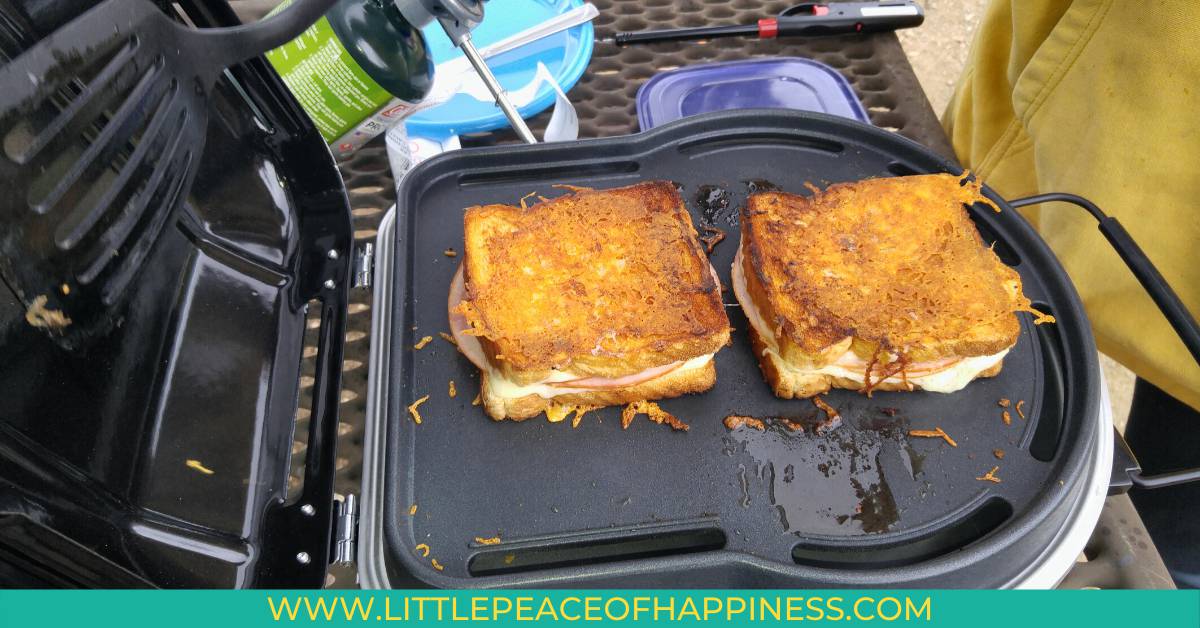
Personally, I like to try to prepare meals in advance and make a real meal that I would have at home. At least for the dinner portion of the trip. With all of the junk food that you’ll munch on over the weekend, it’s nice to have a real meal for at least one of the nights.
If you want to prepare a normal dinner meal (think chicken, broccoli, and rice, etc,), it’s all in the prep work. I also save this type of meal for the second night we’re there since the first night we always arrive during the evening anyways and at that point we’re just snacking until bedtime.

Check out our Coleman Fold N Go Portable Grill that we love!
You can prepare your meals by cutting all of your veggies in advance and pack them in a foil pack with all the seasonings. Then toss them on the grill when it’s time to cook. For the proteins, I cut and marinade them a night before we leave and put them in the freezer. By the time the second night comes, they’ll be defrosted and ready for the grill.
Do you like pasta? Boil your noodles in advance and bring your favorite sauce to toss it all together in a pot and grill up your protein.
What Clothes to Wear Camping
Before packing clothes, check the weather so you’re prepared for what’s to come. I recommend packing for when it rains, for heat, and for cold. I really love getting my clothing and camping gear from Sierra Trading Post because you can get a great deal for all of the products they carry!
Consider clothes that will dry easily and will wick away sweat. We avoid cotton where we can and generally pack pieces that are synthetic, fleece, or wool and appropriate for the weather.
Choose clothes that can be easily layered and even some pieces that you can wear more than once. Bring multiple shoes for when you’re at camp, when you’re exploring, and another pair related to the recreational activity you’ll be doing.
If you’re swimming, then of course bring your swimming gear and a towel. For your socks and underwear, I suggest bringing an extra pair or two, because you never know what could happen on your trip. We like Darn Tough Socks, because of their awesome lifetime warranty.
For clothes to sleep in, this is another reason I suggest wearing layers and bringing an extra pair of socks. It’s better to be warmer when you sleep so you take layers off instead of being cold in the middle of the night.
Camping at higher elevations have very cold nights and sleep quality can really affect your trip.

Activities to do when You’re Camping
When you’re camping there are so many things you can do to enjoy your time in nature. When choosing your camping destination, check out the suggested activities that you can do in the area.
Enjoy hikes? Check out the trail maps for your campground and read reviews on AllTrails.com for hike quality, see the photos, and make sure it’s the right distance and elevation gain.
Some campsites offer fishing and you can check out the fish stock inventory through the agency’s website. Personally, I haven’t seen this at many private campgrounds, but I haven’t stayed at many of those either.
Do you want to keep it low key? You can just hang out at the campsite all day with your favorite book or bring some lawn or card games and just enjoy having a good time outside.
Related Articles:
- 20 Camping Gear Essentials you Don’t Want to Forget
- How to DIY a Solar Outdoor Camp Shower on a Budget
- 25 Top Travel Tips to Consider When Planning Your Vacation
Outdoor Ethics & Leave No Trace
As you enjoy the great outdoors and appreciate all that nature is and has to offer, I want you to remember how you are able to enjoy this experience to begin with.
In my previous work with natural resource managers, we worked together to protect and conserve America’s wilderness areas so that present and future wildlife and people still have these wild spaces to enjoy.
From one fellow camper to another, there are practices of outdoor etiquette that we should follow to make this an enjoyable experience for others. Whether you’re camping on public or private lands, I believe that the principles of being outdoors should still be followed.
Below, I’ll quickly go over the 7 Principles of Leave No Trace that every outdoor recreationist should follow. For a more detailed breakdown of each principle, please visit the Leave No Trace Website.
No time to read it all? Here’s a quick list. But be sure to read this later when you get a chance!
- Plan Ahead and Prepare
- Travel and Camp on Durable Surfaces
- Dispose of Waste Properly
- Leave What you Find
- Minimize Campfire Impacts
- Respect Wildlife
- Be Considerate of Other Visitors
Plan Ahead and Prepare
Congratulations!! By reading this post, you’re already on your way to planning your next camping trip and preparing for all the things that go with it. A successful camping trip is all in the preparation.
This rule holds true from the clothes you pick based on the weather, the shoes for the terrain you’ll be on, the type of food you’ll bring depending on your cooking instrument, etc.
Doing your research on the campground, surrounding area, the weather, and preparing any food ahead of time will make your trip go much smoother.
Travel and Camp on Durable Surfaces
This principle is easier to follow on designated camping areas that have paved trails and obvious camping spots. By obvious, I mean a barren area of land with little vegetation for you to pitch a tent on.
However, for those who are more experienced in the great outdoors, this principle still applies and is done with caution. Travelling and camping on durable surfaces is to protect the existing vegetation of the area from erosion and reduce the impression of human use.
For anyone in the outdoors, travelling on a route that is already established is preferred over creating a new path that can lead to further degradation of the vegetation. And if travelling on the vegetation is necessary,do so with caution so the landscape will recover quickly from the trammeling.
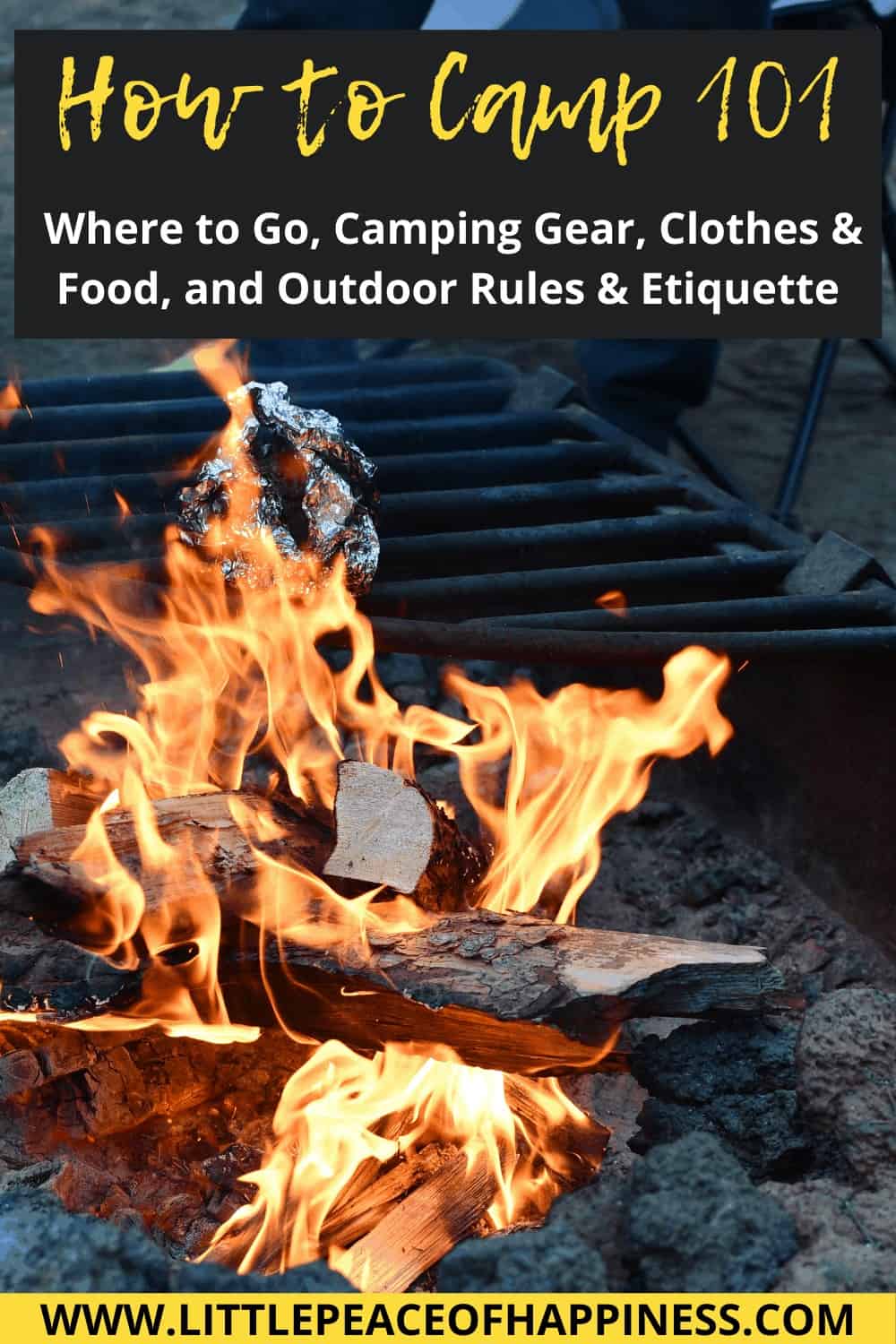
Dispose of Waste Properly
Your natural areas are not dumping grounds for food waste, fishing lines, empty soda and beer cans, or cigarette butts, etc. Whatever you bring into the campsite, be sure to pack it all out. If you’re feeling up to it, if you see some trash left by an irresponsible visitor, please pick it up.
Remember that these natural areas are not only a recreational experience for yourself and other visitors but home to many wildlife. As campers, we are visitors in their natural home environment and must pick up after ourselves.
This is a big one for me and it always upsets me every time I see waste left or someone polluting our natural areas. I can harp on this for a while, but I won’t put you through that. But please, the big picture here is pack out when you bring in and be prepared with enough trash bags to bring it all out.
If the campgrounds provide you with bear-proof trash bins, use them properly and be sure to close them. A habituated bear is a dead bear and as visitors, we need to do our best to reduce the human-conflict as best as possible.
Disposing of waste goes beyond trash, it includes human waste and feminine products as well. For a more detailed breakdown of each principle, please visit the Leave No Trace Website.
Related Articles:
- 20 Camping Gear Essentials you Don’t Want to Forget
- How to DIY a Solar Outdoor Camp Shower on a Budget
- 25 Top Travel Tips to Consider When Planning Your Vacation
Leave What You Find
This may not be known to many people who are out there enjoying the outdoors today. But certain natural resources are used by the wildlife who live in the area and some of those natural resources are slow growing and should not be removed.
Depending on the jurisdiction, some federal lands do not allow any removal of any kind from the natural area. However, in some areas of U.S. Forest Service lands may allow the collection of natural resources depending on the type and the quantity.
In order to protect our natural areas and not deplete the natural resources that many wildlife rely on to survive, it is best to enjoy what you find in nature in its place and leave it there when you are done.
Minimize Campfire Impacts
Living in Colorado or somewhere similar where the summer air is dry and hot, managing your campfire and putting it out properly is a must. Really, managing a campfire anywhere in the world is a must.
A campfire that is not extinguished correctly plus high winds is a recipe for a wild fire in the making that may take weeks or even months to put out.
There are many aspects to minimizing your campfire impacts as much as possible. I’ll cover the big ones, but I encourage you to check out the Leave No Trace Website for more information.
When you’re camping, check with the area and the jurisdiction for any fire bans. This can be due to the area and weather. If fires are allowed, follow the rules and do them in a contained and provided fire pit.
Buy your firewood locally and if you’re finding wood at the campsite, look for downed and dry wood to minimize your environmental impact. Never cut down wood at the campsite.
When you’re done, be sure to put it out with water. Lots and lots of water and break up the pieces. What may look extinguished may not actually be. Lastly, please don’t throw your candy wrappers and foil in the flames.

Respect Wildlife
When you’re out in nature, there’s a chance you may encounter a few wildlife on your camping trip. As a visitor to their space, some visitors forget that seeing wildlife out in the open doesn’t mean they’re in a zoo.
The animals are not there to entertain us, be fed by us, or be touched or harassed. We as visitors are in their home and must allow them comfortable space to move about as they normally would if we weren’t there.
If you come upon wildlife, appreciate their presence and the opportunity you have to see them. Be quiet and don’t make any sudden movements to avoid scaring them. Keep a safe distance and watch them from afar.
I remember seeing a guy with a 400x prime lens standing 1 foot away from a bison in Yellowstone. Not a smart choice my friend, he’s lucky he wasn’t impaled by the animal. Getting too close to wildlife can lead to a dangerous situation for humans and can lead to the death of the animal.
So please, respect wildlife and their space.
Be Considerate of Other Visitors
A big part of outdoor ethics is to be considerate of others who are also out enjoying their outdoor recreation. We’re all out here trying to enjoy the same space and some of us may enjoy it a little bit differently.
While you are enjoying your outdoor creation, be mindful of how it can be impacting another visitor’s experience. Playing loud music on your bluetooth speaker or cellphone during your nature hike may be ruining the experience of another visitor.
The outdoors belongs to all of us and while we have to protect and conserve as much of it as we can, we also need to be mindful of those around us so we can all have a positive experience.

Conclusion
Camping is an inexpensive way to enjoy the outdoors and get out with your family and friends. It has an initial investment upfront that will quickly pay off after a few trips.
Whether you’re a tent, rv, or cabin camper, there is something for everyone if you enjoy being outdoors. Starting out, you can join other experienced campers because chances are they have enough gear to shelter you and may even have a spare sleeping bag you can borrow.
You have learned everything you need to know to plan out your first camping trip and all that you need to bring. You are a well informed and educated outdoor recreationist who has the outdoor etiquette of a seasoned camper.
A successful camping trip is all in the prep work and planning ahead. If you think you’re ready to try out camping and want to learn more, check out my post on camping gear essentials that you don’t want to forget!
Do you like checklists? I put a camping checklist together to help you get started when you’re packing for your next outdoor adventure. Fill out the form below to download your camping PDF checklist.
Wishing you a Little Peace of Happiness on your camping adventure!

Related Articles:
- 20 Camping Gear Essentials you Don’t Want to Forget
- How to DIY a Solar Outdoor Camp Shower on a Budget
- 25 Top Travel Tips to Consider When Planning Your Vacation
Pin Me for Later!

